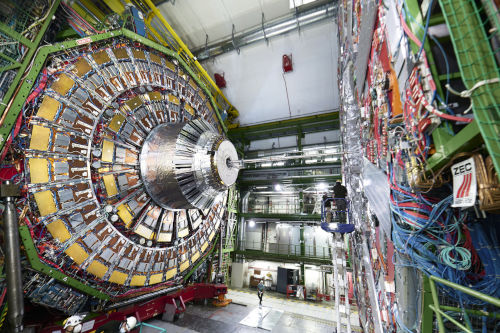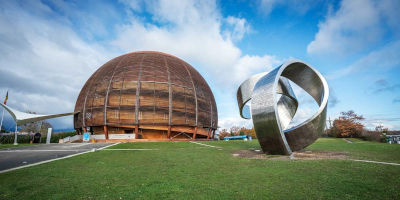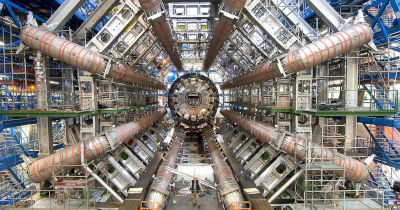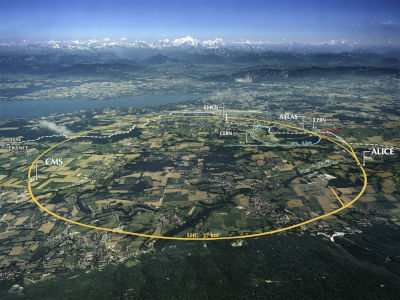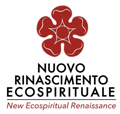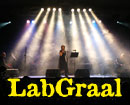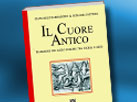| English Page |
CERN at 70 Inspiring the Future |
 |
 |
| 04 February 2024 | ||||||||
CERN Celebrates 70 Years of Scientific Discovery and Innovation
This year holds special significance for CERN as the Organization celebrates its 70th anniversary on 29 September 2024. CERN was established after the Second World War by a handful of Europe’s leading scientists and diplomats with a mission to bring excellence in scientific research back to Europe and foster peaceful collaboration among nations. Today, CERN has 23 Member States, ten Associate Member States, and a vibrant community of 17 thousand people, representing more than 110 nationalities. With many mysteries of the fundamental nature of the Universe still to be unravelled, CERN is preparing to continue this inspiring journey of exploration. We have put together a rich and beautiful programme to honour CERN’s contributions to scientific knowledge, technological innovation, and international collaboration over the past 70 years, culminating with an official ceremony on 1 October. From conversations with distinguished scientists to exhibitions showcasing CERN science and its people, to many public engagement initiatives at CERN, in Member States and Associate Member States, and beyond, there is something for everyone in this exciting programme. Geneva, January 25, 2024. Today CERN, the European Laboratory for Particle Physics, announced a programme to celebrate its 70th anniversary in 2024. This landmark year honours CERN's remarkable contributions to scientific knowledge, technological innovation and international collaboration in the field of particle physics. Throughout the year, a variety of events and activities will showcase the Laboratory’s rich past as well as its bright future.
Leading up to an official high-level ceremony on 1 October, the preliminary anniversary programme, spanning the entire year, offers a rich array of events and activities, aimed at all types of audiences, at CERN and in the Organization’s Member States and Associate Member States and beyond. The first public event, scheduled for 30 January, will combine science, art and culture, and will feature a panel of eminent scientists discussing the evolution of particle physics and CERN’s significant contributions in advancing this field. On 7 March and 18 April, special events will showcase the practical applications of high-energy physics research in everyday life. Mid-May will see a focus on the importance of global collaboration in scientific endeavours, while the events in June and July will explore the current unanswered questions in particle physics and the facilities being planned for future breakthroughs. From talks by distinguished scientists and exhibitions showing CERN’s cutting-edge research and the diversity of its science and its people, to public engagement initiatives worldwide, everyone will find something to enjoy in this programme.
“CERN’s achievements over the 70 years of its history show what humanity can do when we put aside our differences and focus on the common good”, says Fabiola Gianotti, CERN Director-General. “Through the celebrations of CERN’s 70th anniversary, we will demonstrate how, over the past seven decades, CERN has been at the forefront of scientific knowledge and technological innovation, a model for training and education, collaboration and open science, and an inspiration for citizens around the world. This anniversary is also a great opportunity to look forward: CERN’s beautiful journey of exploration into the fundamental laws of nature and the constituents of matter is set to continue into the future with new, more powerful instruments and technologies.” CERN came to life in 1954, in the aftermath of the Second World War, to bring excellence in scientific research back to Europe and to foster peaceful collaboration in fundamental research. This collective effort has pushed back the frontiers of human knowledge and of technology. As more powerful accelerators and experiments were built, foundational discoveries and innovations were made: among others, Georges Charpak revolutionised detection with his multiwire proportional chamber in 1968, the neutral currents were discovered in the 1970s, the W and Z bosons were discovered in 1983, the precision measurement of the Z boson and of other parameters of the electroweak theory was made in the 1990s thanks to the Large Electron Positron (LEP) collider, the Large Hadron Collider started up in 2009, and the Higgs boson was discovered in 2012. CERN is also the birthplace of the World Wide Web and has generated technologies that are used in other fields, including medical diagnostics and therapy and environmental protection.
Currently, the Laboratory is home to the Large Hadron Collider, the world’s most powerful particle accelerator. Building on its remarkable legacy of research and technological development, CERN is already looking to the future, in particular by studying the feasibility of a Future Circular Collider. “This anniversary year is for everyone and should engage and inspire scientists, policy makers and the public. We are looking forward to welcoming everyone at CERN for the many events being planned, but also to the celebrations in our Member States, Associate Member States and beyond”, says Luciano Musa, coordinator of the CERN 70th anniversary. “These international events are a testament to CERN's impact on scientific knowledge, technological development and worldwide collaboration.” CERN extends an invitation to everyone to take part in these inspiring events, which aim to kindle scientific curiosity, honour scientific progress and collaborative efforts, and underscore the role of science in society. Join us in this year of celebration as we honour our glorious past and shape a bright future for CERN and its community. For the complete CERN70 anniversary events and programme of activities, please visit: cern.ch/cern70. For more informations, read our digital media kit. About CERN |

